最新人教版新目标 八年级英语初二上册Unit1 Where did you go on vacation单元同步检测试卷
人教版英语八年级上册_Unit_1_Where_did_you_go_on_vacation教材全解
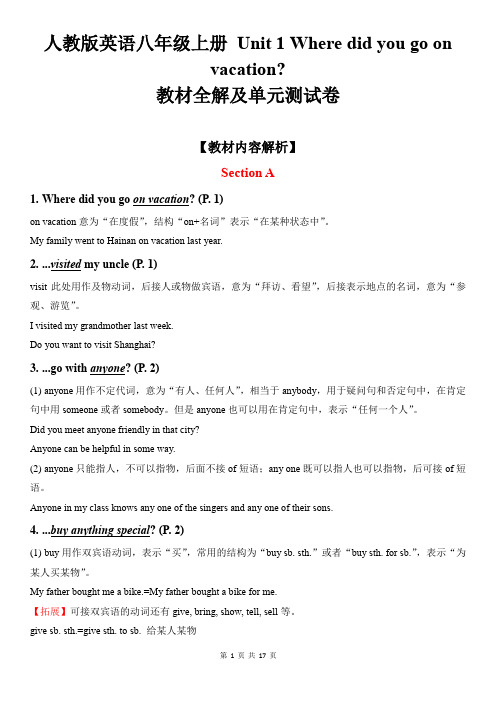
人教版英语八年级上册Unit 1 Where did you go onvacation?教材全解及单元测试卷【教材内容解析】Section A1.Where did you go on vacation? (P. 1)on vacation意为“在度假”,结构“on+名词”表示“在某种状态中”。
My family went to Hainan on vacation last year.2....visited my uncle (P. 1)visit此处用作及物动词,后接人或物做宾语,意为“拜访、看望”,后接表示地点的名词,意为“参观、游览”。
I visited my grandmother last week.Do you want to visit Shanghai?3....go with anyone? (P. 2)(1)anyone用作不定代词,意为“有人、任何人”,相当于anybody,用于疑问句和否定句中,在肯定句中用someone或者somebody。
但是anyone也可以用在肯定句中,表示“任何一个人”。
Did you meet anyone friendly in that city?Anyone can be helpful in some way.(2)anyone只能指人,不可以指物,后面不接of短语;any one既可以指人也可以指物,后可接of短语。
Anyone in my class knows any one of the singers and any one of their sons.4....buy anything special? (P. 2)(1)buy用作双宾语动词,表示“买”,常用的结构为“buy sb. sth.”或者“buy sth. for sb.”,表示“为某人买某物”。
My father bought me a bike.=My father bought a bike for me.【拓展】可接双宾语的动词还有give, bring, show, tell, sell等。
八年级英语上册 unit 1 where did you go on vacation(短语+句型+练习)(新版)人教新目标版
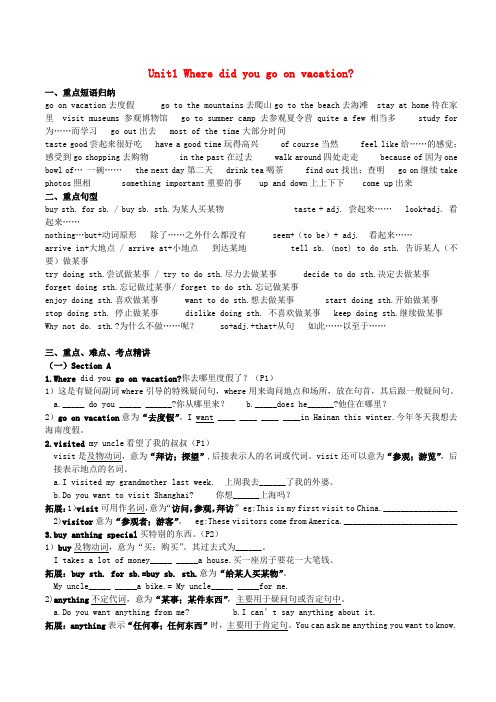
Unit1 Where did you go on vacation?一、重点短语归纳go on vacation去度假 go to the mountains去爬山go to the beach去海滩 stay at home待在家里 visit museums 参观博物馆 go to summer camp去参观夏令营quite a few相当多 study for 为……而学习 go out出去 most of the time大部分时间taste good尝起来很好吃 have a good time玩得高兴 of course当然 feel like给……的感觉;感受到go shopping去购物 in the past在过去 walk around四处走走 because of因为one bowl of…一碗…… the next day第二天 drink tea喝茶 find out找出;查明 go on继续take photos照相 something important重要的事 up and down上上下下 come up出来二、重点句型buy sth. for sb. / buy sb. sth.为某人买某物 taste + adj. 尝起来…… look+adj. 看起来……nothing…but+动词原形除了……之外什么都没有 seem+(to be)+ adj. 看起来……arrive in+大地点 / arrive at+小地点到达某地 tell sb. (not) to do sth. 告诉某人(不要)做某事try doing sth.尝试做某事 / try to do sth.尽力去做某事 decide to do sth.决定去做某事forget doing sth.忘记做过某事/ forget to do sth.忘记做某事enjoy doing sth.喜欢做某事 want to do sth.想去做某事 start doing sth.开始做某事stop doing sth. 停止做某事 dislike doing sth. 不喜欢做某事 keep doing sth.继续做某事Why not do. sth.?为什么不做……呢? so+adj.+that+从句如此……以至于……三、重点、难点、考点精讲(一)Section A1.Where did you go on vacation?你去哪里度假了?(P1)1)这是有疑问副词where引导的特殊疑问句,where用来询问地点和场所,放在句首,其后跟一般疑问句。
人教新目标八年级英语上册Unit1Wheredidyougoonvacation知识点讲解
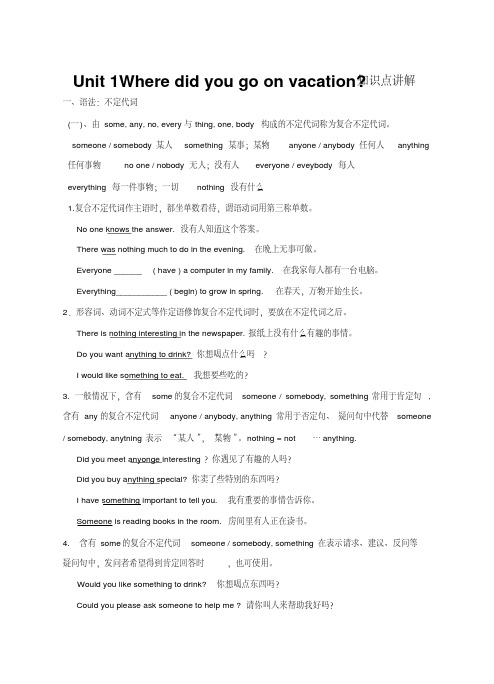
Unit 1Where did you go on vacation?知识点讲解一、语法:不定代词(一)、由some, any, no, every与thing, one, body 构成的不定代词称为复合不定代词。
someone / somebody 某人something 某事;某物anyone / anybody 任何人anything 任何事物no one / nobody 无人;没有人everyone / eveybody 每人everything 每一件事物;一切nothing 没有什么1.复合不定代词作主语时,都坐单数看待,谓语动词用第三称单数。
No one knows the answer. 没有人知道这个答案。
There was nothing much to do in the evening. 在晚上无事可做。
Everyone ______ ( have ) a computer in my family. 在我家每人都有一台电脑。
Everything___________ ( begin) to grow in spring. 在春天,万物开始生长。
2.形容词、动词不定式等作定语修饰复合不定代词时,要放在不定代词之后。
There is nothing interesting in the newspaper.报纸上没有什么有趣的事情。
Do you want anything to drink?你想喝点什么吗?I would like something to eat. 我想要些吃的?3. 一般情况下,含有some的复合不定代词someone / somebody, something常用于肯定句,含有any的复合不定代词anyone / anybody, anything常用于否定句、疑问句中代替someone / somebody, anytning表示“ 某人”,“某物”。
人教新目标八年级上册英语《Unit 1 Where did you go on vacation?》
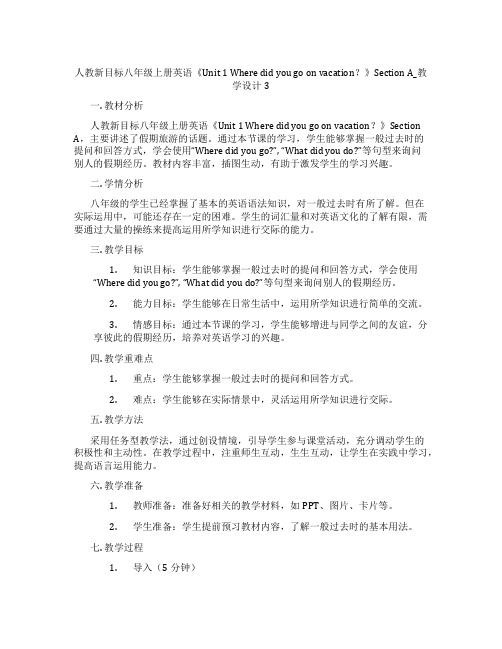
人教新目标八年级上册英语《Unit 1 Where did you go on vacation?》Section A_教学设计3一. 教材分析人教新目标八年级上册英语《Unit 1 Where did you go on vacation?》Section A,主要讲述了假期旅游的话题。
通过本节课的学习,学生能够掌握一般过去时的提问和回答方式,学会使用“Where did you go?”, “What did you do?”等句型来询问别人的假期经历。
教材内容丰富,插图生动,有助于激发学生的学习兴趣。
二. 学情分析八年级的学生已经掌握了基本的英语语法知识,对一般过去时有所了解。
但在实际运用中,可能还存在一定的困难。
学生的词汇量和对英语文化的了解有限,需要通过大量的操练来提高运用所学知识进行交际的能力。
三. 教学目标1.知识目标:学生能够掌握一般过去时的提问和回答方式,学会使用“Where did you go?”, “What did you do?”等句型来询问别人的假期经历。
2.能力目标:学生能够在日常生活中,运用所学知识进行简单的交流。
3.情感目标:通过本节课的学习,学生能够增进与同学之间的友谊,分享彼此的假期经历,培养对英语学习的兴趣。
四. 教学重难点1.重点:学生能够掌握一般过去时的提问和回答方式。
2.难点:学生能够在实际情景中,灵活运用所学知识进行交际。
五. 教学方法采用任务型教学法,通过创设情境,引导学生参与课堂活动,充分调动学生的积极性和主动性。
在教学过程中,注重师生互动,生生互动,让学生在实践中学习,提高语言运用能力。
六. 教学准备1.教师准备:准备好相关的教学材料,如PPT、图片、卡片等。
2.学生准备:学生提前预习教材内容,了解一般过去时的基本用法。
七. 教学过程1.导入(5分钟)通过展示一些假期旅游景点的图片,引导学生谈论自己的假期经历,引出本节课的主题。
2.呈现(5分钟)教师通过PPT展示本节课的主要句型:“Where did you go?”, “What did you do?”等,同时给出相应的回答,让学生感知和理解这些句型的用法。
人教新目标八年级英语上册Unit1Wheredidyou教案

XX 学校--用心用情 服务教育!用心用情 服务教育 1 《Unit 1 Where did you go on vacation (第一课时)》教学目标:知识目标Words and expressions: (1) anyone anywhere wo nderful few quite a few most something nothing everyone of course myself yourself hen pig seem bored som eone diary (2)go on vacation b uy something special quite a few of course(3) Where did you go on vacation? Did you go out with a nyone?能力目标:掌握一些规则动词和不规则动词的过去式.掌握否定代词的用法.三|情感目标:通过讨论假期,增进学生对国内外风景名胜的认识,热爱大自然,形成积极向上的生活观.语法难点:时间表达法教学过程:不定代词的用法.Step1 Talk about the students ’ vacation. Where did you go on v acation?Did you have a good time?Step 2 Learn new words.Step3. Presentation Learn the following sentences by PPT:Where did you go on vacation? Did you go out with anyone? Did you buy anything speci al?How was the food?Did everyone have a good time?Step4: Listen to 1b and math the activities with the pictures..First let the Ss listen carefully..Then check the answers.Step5: Listen and number the people in the picture.Step6: Listening 2a and complete the chart.. Step7:Listening again . Chec k Yes or No for each question. Finish 2b.Step8: 2d Role-play the conversation.Step 9: Test 完成单词---Lisa, did you go a __________ last weekend?---Yes, I went to Hangzhou with my sister.I bought something for my friends, but n________ for myself. My daughter usually keeps a d_______ every day.The movie isn ’t interesting at all, so I feel b_______ about it. There are f________ students in the classroom. They are all having a P.E. class on the playground.教学后记:。
最新人教版英语八年级上册Unit1-Where-did-you-go-on-vacation

A: Grace, where did you go on vacation? B: I went to New York City. A: Oh, really? Did you go with anyone? B: Yes, I went with my mother.
stop trip
Test --in --class
1.Tom ____(stay) at home last year. 2.Did you ___ (go) to the beach yesterday? 3.Tom ___ (去爬山)with Jim last year. 4.I went to Beijing with my mom on vacation.(划线 提问) ___ ___ you ____ on vacation? 5.Sally went to New York yesterday.(变一般疑问句 并做否定回答) ___ Sally ___ to New York yesterday? ____,____ _____.
Where did they go on vacation?
Name
1. Tina
2. Xiang Hua 3. Sally 4. Bob 5. Tom
Activities
went to the mountains. went to New York City.
stayed at home.
visited his uncle.
3.—Where _______ you half an hour ago? —I ______ in the school library. A.are, am B. are, was C. were, was D. were, am
最新人教新目标八年级上册英语Unit 1 Where did you go on vacation全单元导学案

第1单元Where did you go on vacation?Section A 单词anyone pron.任何人anywhere adv.在任何地方wonderful adj.精彩的;绝妙的few adj.&pron.不多;很少most adj.,adv.&pron.最多;大多数something pron.某事;某物nothing pron.没有什么;没有一件东西everyone pron.每人;人人;所有人myself pron.我自己;我本人yourself pron.你自己;您自己hen n.母鸡pig n.猪seem v.好像;似乎;看来bored adj.厌倦的;烦闷的someone pron.某人diary n.日记;记事簿短语go on vacation去度假anything special什么特别的stay at home待在家里have a good time玩得开心quite a few相当多;不少of course当然;自然句型1.—Did you go out with anyone? 你和别人一起出去的吗?—No. No one was here. Everyone was on vacation.不。
没有人在这里。
大家都去度假了。
2.—How was the food? 食物怎么样?—Everything tasted really good! 每样东西尝起来都很美味!Section B 单词activity n.活动enjoyable adj.有乐趣的;令人愉快的decide v.决定;选定try v.& n.尝试;设法;努力bird n.鸟bicycle n.自行车;脚踏车building n.建筑物;房子trader n.商人wonder v.想知道;琢磨difference n.差别;差异top n.顶部;表面wait v.等待;等候umbrella n.伞;雨伞wet adj.湿的;潮湿的;下雨的duck n.鸭below prep.&adv.在……下面;到……下面hungry adj.饥饿的as adv.像……一样;如同conj.当……时;如同hill n.小山;山丘dislike v.&n.不喜爱(的事物);厌恶(的事物)enough adj.&adv.足够的(地);充足的(地);充分的(地)短语feel like给……的感觉;感受到because of因为arrive in到达 a lot of许多;大量的take some photos拍一些照片too many太多句型1.There are a lot of new buildings now, but many of the old buildings are still there. 现在那里有许多新的建筑物,但是许多老式的建筑物还在那里。
最新人教新目标英语八年级上册 Unit 1 Where did you go on vacation?单元知识归纳

Unit 1 Where did you go on vacation?单元知识目标突破词汇SectionAanyone pron.任何人→P3SectionBfeel like给……的感觉;感受到→P10quite a few 相当多;不少→P3building n.建筑物;房子→P10wonder v. 想知道;琢磨→P11most adj.,adv. &pron. 最多;大多数→P4difference n.差别;差异→P11wait v.&n. 等待;等候→P12 seem v. 好像;似乎;看来→P4because of 因为→P12bored adj. 厌倦的;烦闷的→P5below prep.&adv. 在……下面;到……下面→P13SectionBactivity n. 活动→P9enough adj. 足够的;充足的;充分的→P13 decide v. 决定;选定→P9try v.& n. 尝试;设法;努力→P9dislike v.&n.不喜爱;厌恶→P14把握句型1.I felt like I was a bird.我感觉像是一只鸟。
feel like后接的是宾语从句。
2.I wonder what life was likehere in the past.我很想知道过去这儿的生活是什么样的。
注意wonder的用法。
3.What a difference a day makes!一天的差别有多大!注意感叹句。
4.And because of the badweather,we couldn't seeanything below.因为这恶劣天气,我们看不到下面的任何景色。
注意because of的运用。
熟悉语法学习不定代词的用法。
规则动词和不规则动词的过去式。
学会交际学会询问度假情况的交际用语。
写作练笔记叙假期发生的事情。
课文翻译Section A 2dRick:Hi,Helen. Long time no see.Helen:Hi,Rick. Yes,I was on vacation last month.Rick:Oh,did you go anywhere interesting?Helen:Yes,I went to Guizhou with my family.Rick:Wow!Did you see Huangguoshu Waterfall?Helen:Yes,I did. It was wonderful!①We took quite a few photos there. What about you?Did you do anything special last month?Rick:Not really.②I just stayed at home most of the time to read and relax.,里克:你好,海伦。
人教新目标八年级上册英语《Unit 1 Where did you go on vacation?》

人教新目标八年级上册英语《Unit 1 Where did you go on vacation?》Section A_教学设计1一. 教材分析人教新目标八年级上册英语《Unit 1 Where did you go on vacation?》Section A,主要介绍了假期旅游的话题。
本节课通过引入旅游的话题,让学生学习一般过去时态的疑问句和回答。
教材内容丰富,插图生动有趣,有利于激发学生的学习兴趣。
本节课的主要语言点是一般过去时态的疑问句和回答,以及相关的旅游词汇。
二. 学情分析八年级的学生已经学习了英语一段时间,对英语有了一定的了解和掌握。
他们好奇心强,喜欢探索新事物,但同时也有可能对英语学习产生疲劳感。
因此,在教学过程中,需要充分调动学生的积极性,激发他们的学习兴趣。
学生的英语水平参差不齐,因此需要针对不同水平的学生进行分层教学。
三. 教学目标1.知识目标:学生能够掌握一般过去时态的疑问句和回答,以及相关的旅游词汇。
2.能力目标:学生能够用英语询问和描述假期旅游的经历。
3.情感目标:通过本节课的学习,学生能够培养对旅游的兴趣,增强对英语学习的热情。
四. 教学重难点1.重点:一般过去时态的疑问句和回答,以及相关的旅游词汇。
2.难点:一般过去时态的疑问句和回答的运用,以及旅游词汇的准确表达。
五. 教学方法1.任务型教学法:通过设定各种旅游相关的任务,让学生在完成任务的过程中学习和运用语言。
2.情境教学法:创设各种旅游情境,让学生在真实的情境中学习英语。
3.小组合作学习:通过小组讨论和合作,提高学生的参与度和积极性。
六. 教学准备1.教师准备:提前准备相关的旅游图片、视频和旅游经历的故事,以及旅游词汇的卡片。
2.学生准备:学生需要提前预习教材,了解本节课的学习内容。
七. 教学过程1.导入(5分钟)通过向学生展示各种旅游图片,引导学生谈论自己的旅游经历,激发学生的学习兴趣。
教师可以提问:“Where did you go on vacation?”,让学生用英语回答。
人教新目标八年级上册英语《Unit 1 Where did you go on vacation?》

人教新目标八年级上册英语《Unit 1 Where did you go on vacation?》Section B_教学设计1一. 教材分析人教新目标八年级上册英语《Unit 1 Where did you go on vacation?》Section B 主要讲述了假期旅行的主题。
通过本节课的学习,学生能够掌握一般过去时的疑问句和回答,以及如何描述过去发生的事情。
教材内容贴近学生的生活,激发学生对旅行的兴趣,提高学生的口头表达能力。
二. 学情分析八年级的学生已经掌握了基本的英语语法知识,具有一般现在时和一般过去时的基础。
在学习本节课之前,学生已经学习了如何用英语描述家庭成员和询问他们的去向。
因此,学生在学习本节课时,能够将已有的知识与新的知识相结合,提高学习效果。
三. 教学目标1.知识目标:–能够听懂、说出一般过去时的疑问句和回答。
–能够用英语描述过去发生的事情。
2.能力目标:–能够与他人用英语交流关于假期旅行的经历。
–能够提高口头表达能力。
3.情感目标:–激发学生对旅行的兴趣,拓宽视野。
–培养学生的团队协作精神。
四. 教学重难点•一般过去时的疑问句和回答。
•如何用英语描述过去发生的事情。
•一般过去时疑问句的构成和用法。
•如何在实际交流中运用一般过去时。
五. 教学方法1.情境教学法:通过设置旅行相关的情境,让学生在实际语境中学习英语。
2.交际法:鼓励学生参与课堂互动,提高学生的口头表达能力。
3.任务型教学法:通过小组合作完成任务,培养学生的团队协作精神。
六. 教学准备1.教学课件:制作与旅行相关的课件,包括图片、视频等。
2.教学道具:准备一些与旅行相关的实物道具,如地图、行李箱等。
3.小组活动准备:划分学习小组,提前分配任务。
七. 教学过程1.导入(5分钟)–教师展示一张旅行图片,引导学生谈论旅行的话题。
–学生分享自己最喜欢的旅行地点和经历。
2.呈现(10分钟)–教师通过课件呈现一般过去时的疑问句和回答。
新人教版八年级英语上册unit1 where did you go on vacation单元分析+教案

Unit1 Where did you go on vacation?单元分析一、教材分析Unit1 Where did you go on vacation?的核心话题为“Talking about holidays, vacations and past events”,主要描述有关假期等过去的事情,学习和运用一般过去时,使学生学会谈论和交流过去发生的事情,让学生在交际活动中学会如何正确用英语谈论自己及询问他人过去的事情与经历,重在培养学生的语言运用能力、实践能力、合作能力及创新意识。
二、教学目标1.知识目标:1) 掌握并能灵活运用本单元出现的重点词汇。
动词及它的过去式:stay(ed), visit(ed), go(went), do(did), is/am(was)2)用“Where did you go...? Did you...?”询问他人过去的经历。
3)掌握以下句式:(1)— Where did sb. go (on vacation)?—Sb.+ went to … (on vacation).(2)— What did sb. do (on vacation)?—Sb. +verb + ed … (on vacation).(3)一般过去时的应用。
2.能力目标:学会谈论发生在过去的事情;能听懂以谈论假期做过的事情和谈论过去的事件及自己的感想为话题的语言材料,并获取相关信息。
能以“Talking about holidays and vacations”,“Talking about past events”为话题与他人进行交流;能利用该话题进行情景对话及角色表演。
3.情感目标:本单元的教学内容与学生的实际生活息息相关,容易激发学生的兴趣,从而乐于运用简单的英语与他人进行交流。
学习活动中学生通过交换对过去发生的事情的描述及看法,从而促进学生之间和师生之间的情感交流,增进友谊。
三、重点和难点1. 一般过去时及其应用。
最新人教新目标英语八年级上册 Unit 1 Where did you go on vacation?教案2
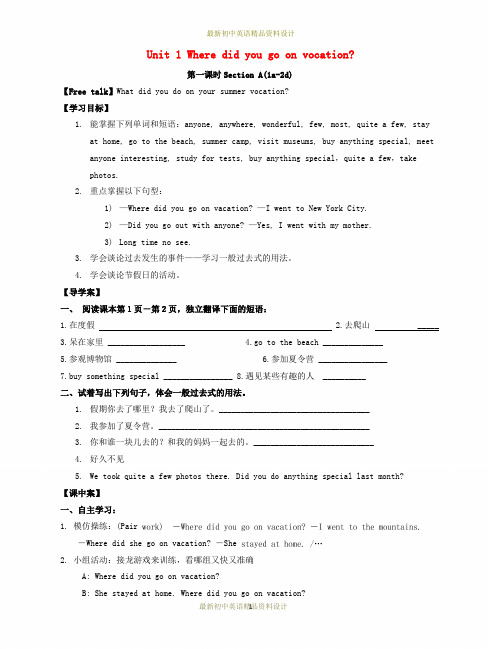
Unit 1 Where did you go on vocation?第一课时Section A(1a-2d)【Free talk】What did you do on your summer vocation?【学习目标】1.能掌握下列单词和短语:anyone, anywhere, wonderful, few, most, quite a few, stayat home, go to the beach, summer camp, visit museums, buy anything special, meetanyone interesting, study for tests, buy anything special,quite a few,takephotos.2.重点掌握以下句型:1)—Where did you go on vacation? —I went to New York City.2)—Did you go out with anyone? —Yes, I went with my mother.3)Long time no see.3.学会谈论过去发生的事件——学习一般过去式的用法。
4.学会谈论节假日的活动。
【导学案】一、阅读课本第1页-第2页,独立翻译下面的短语:1.在度假2.去爬山 _____3.呆在家里 __________________4.go to the beach ______________5.参观博物馆 ______________6.参加夏令营 ________________7.buy something special ________________ 8.遇见某些有趣的人 __________二、试着写出下列句子,体会一般过去式的用法。
1.假期你去了哪里?我去了爬山了。
___________________________________2.我参加了夏令营。
新目标英语八年级上册Unit1-where-did-you-go-on-vacation
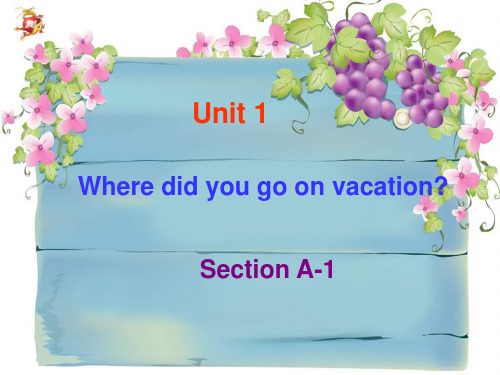
Where did he go on vacation? He visited museums.
Where did they go on vacation? They went to summer camp.
They went to the mountains. They went to the beach.
1. 在英语中,anything, something, nothing和
everything是用于指代事物的复合不定代词,与之 相对应的复合不定代词anyone, someone, no one和 everyone (anybody, somebody, nobody和everybody) 用于指人。与形容词连用时,形容词必须置于复合 不定词之后,语法上称作“后置”。
There is nothing wrong with the TV. Everybody likes to be free.
Notes
(3)some-不定代词,通常用于肯定句中;any-不定代 词则多用于否定句、疑问句和条件状语从句中。 但some-可用于表请求、邀请、预料对方会作肯定回答 时的疑问句中。 Someone called on her last week. There isn’t anyone else there. Is anybody over there? Could you give me something to eat? (4)形容词修饰不定代词时,通常要放在不定代词之后。 There is something wrong with your eyes.
事情) about your vacation, Jenny.
4. They caught _q__u_it_e_ _a__ _fe_w__ (相当多的) insects in the forest.
人教新目标八年级上册英语《Unit 1 Where did you go on vacation?》

人教新目标八年级上册英语《Unit 1 Where did you go on vacation?》Section B_教学设计2一. 教材分析人教新目标八年级上册英语《Unit 1 Where did you go on vacation?》Section B 主要包括两部分内容:一是听力练习,二是口语交际。
通过本节课的学习,学生能够掌握一般过去时的疑问句和回答,学会用英语询问他人的假期经历,并能用一般过去时进行回答。
教材内容丰富,贴近学生生活,有利于激发学生的学习兴趣。
二. 学情分析八年级的学生已经掌握了部分英语语法知识,具备一定的听说读写能力。
但学生在使用一般过去时方面还存在困难,需要通过大量的练习来巩固。
此外,学生对于描述自己和他人的假期经历可能感到无从下手,需要教师在课堂上进行引导和鼓励。
三. 教学目标1.知识目标:学生能够掌握一般过去时的疑问句和回答,学会用英语询问他人的假期经历,并能用一般过去时进行回答。
2.能力目标:学生能够听懂、会说、会写本节课的重点词汇和句型。
3.情感目标:通过本节课的学习,学生能够增进与同学之间的友谊,分享彼此的假期经历。
四. 教学重难点1.重点:一般过去时的疑问句和回答,以及本节课的重点词汇和句型。
2.难点:如何运用一般过去时描述自己和他人的假期经历。
五. 教学方法1.任务型教学法:通过设置各种任务,让学生在完成任务的过程中学会运用所学知识。
2.交际法:鼓励学生进行口语交流,提高学生的交际能力。
3.情境教学法:创设各种情境,让学生在真实的环境中学会使用英语。
六. 教学准备1.教师准备:准备好课件、听力材料、相关图片等教学资源。
2.学生准备:预习本节课的内容,准备好相关的词汇和句型。
七. 教学过程1.导入(5分钟)教师通过提问学生“What did you do last weekend?”引出本节课的主题“假期经历”。
引导学生用英语表达自己的假期经历,激发学生的学习兴趣。
人教新目标版英语八上Unit 1《Where did you go on vacation》精美教案

人教新目标版英语八上Unit 1《Where did you go on vacation》精美教案一. 教材分析本课选自人教新目标版英语八年级上册Unit 1《Where did you go on vacation》。
本课的主题是询问假期去向,通过描述假期的旅行经历,让学生运用一般过去时谈论过去的事情。
本课的主要语言点是一般过去时的疑问句和回答,以及表示过去某时刻正在进行的句子。
本课的内容与学生的生活实际紧密相连,能够激发学生的学习兴趣和积极性。
二. 学情分析八年级的学生已经掌握了基本的英语语法知识,对于一般过去时已经有了初步的了解。
但是,学生在运用一般过去时进行交际时还存在一定的困难,需要在教师的引导下进行进一步的练习和巩固。
同时,学生的词汇量和阅读量还需要进一步的扩大,以便能够更好地理解和运用本课的内容。
三. 教学目标1.能够正确使用一般过去时进行疑问句和回答。
2.能够描述过去某时刻正在发生的事情。
3.通过描述假期的旅行经历,激发学生对旅行的兴趣和热爱。
四. 教学重难点1.一般过去时的疑问句和回答。
2.表示过去某时刻正在进行的句子。
五. 教学方法1.情境教学法:通过设置情境,让学生在真实的语境中学习和使用英语。
2.交际教学法:通过小组讨论和角色扮演等方式,让学生在实际交际中运用英语。
3.任务型教学法:通过完成具体的任务,让学生在实践中学习和运用英语。
六. 教学准备1.教学PPT:包括本课的课文内容、图片、视频等。
2.教学卡片:用于操练和巩固所学内容。
3.教学挂图:用于展示和引导学生思考。
七. 教学过程1.导入(5分钟)通过向学生展示一些美丽的旅游图片,引导学生谈论他们假期去过的有趣地方。
同时,教师可以询问学生:“Where did you go on vacation?”,让学生用中文回答,从而引出本课的主题。
2.呈现(10分钟)教师通过PPT展示本课的课文内容,同时用中文解释关键词汇和短语,如“go on vacation”、“go to”、“visit”等。
人教新目标八年级上册英语《Unit 1 Where did you go on vacation?》

人教新目标八年级上册英语《Unit 1 Where did you go on vacation?》Section A_教学设计2一. 教材分析人教新目标八年级上册英语《Unit 1 Where did you go on vacation?》Section A,主要讲述了假期旅游的话题。
本节课通过引入 vacation 这一主题,让学生学会询问他人假期去哪里旅游以及如何描述自己的假期经历。
教材内容丰富,插图生动,有助于激发学生的学习兴趣,提高他们的语言运用能力。
二. 学情分析八年级的学生已经掌握了基本的英语语法和词汇,具备一定的听说读写能力。
但他们在实际运用英语进行交流时,还存在着一定的困难。
因此,在教学过程中,教师需要关注学生的个体差异,创设真实、有趣的语言环境,让他们在实践中提高英语水平。
三. 教学目标1.知识目标:让学生掌握 vacation 相关词汇,学会询问他人假期去哪里旅游以及如何描述自己的假期经历。
2.能力目标:提高学生的听说读写能力,使他们能够在实际情境中运用英语进行交流。
3.情感目标:培养学生对旅游的兴趣,增强他们的生活体验。
四. 教学重难点1.重点:掌握 vacation 相关词汇,学会询问他人假期去哪里旅游以及如何描述自己的假期经历。
2.难点:运用英语进行实际交流,提高语言运用能力。
五. 教学方法1.任务型教学法:通过完成各种任务,让学生在实践中学习英语,提高他们的语言运用能力。
2.情境教学法:创设真实、有趣的语言环境,激发学生的学习兴趣。
3.交际教学法:鼓励学生积极参与课堂交流,提高他们的听说能力。
六. 教学准备1.准备相关旅游图片、视频等教学资源。
2.设计各种任务,如小组讨论、角色扮演等。
3.准备听力材料,让学生练习听力。
七. 教学过程1.导入(5分钟)利用图片、视频等教学资源,引入 vacation 这一主题,激发学生的学习兴趣。
2.呈现(5分钟)展示 vacation 相关词汇,如 beach, mountn, temple 等,并解释它们的意思。
最新人教新目标版中学八年级英语上册 Unit 1 Where did you go on vacation?教案
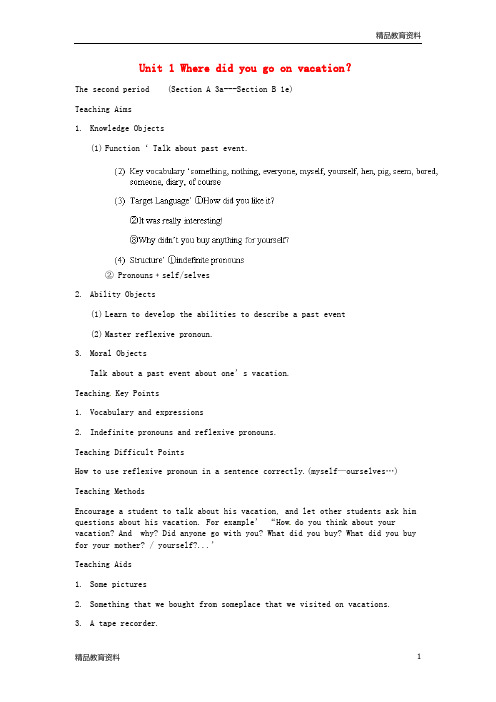
Unit 1 Where did you go on vacation?The second period (Section A 3a---Section B 1e)Teaching Aims1.Knowledge Objects(1)Function‘ Talk about past event.② Pronouns﹢self/selves2.Ability Objects(1)Learn to develop the abilities to describe a past event(2)Master reflexive pronoun.3.Moral ObjectsTalk about a past event about one’s vacation.Teaching Key Points1.Vocabulary and expressions2.Indefinite pronouns and reflexive pronouns.Teaching Difficult PointsHow to use reflexive pronoun in a sentence correctly.(myself—ourselves…)Teaching MethodsEncourage a student to talk about his vacation, and let other students ask him questions about his vacation. For example’ “How do you think about your vacation? And why? Did anyone go with you? What did you buy? What did you buy for your mother? / yourself?...’Teaching Aids1.Some pictures2.Something that we bought from someplace that we visited on vacations.3. A tape recorder.Teaching ProceduresStep1 GreetingT’ Good morning class!S’ Good morning teacher!T’ I like traveling. This is a picture I took on last vacation. Can you tell me where I went?S1’ Beijing.T’ Great! Did you go anywhere on your vacation?S2’ I went to…S’ How did you like it? Now who can ask him questions just like me?S3’ What did you buy?S2’ I didn’t bu y anything there.S4’Why?S2’ I didn’t like anything there.S5’ How was the food?S2’ It was …Objects’ Review the past tense.Step2 PresentationRead the new words ‘nothing, everyone, myself, yourself, hen ,pig, seem, bored, someone, diary, of course’. T hen ask some students to read them, and correct the wrong pronunciations.Step3 3aStep4 PresentationLearn reflexive pronounsGet the students to learn some reflexive pron ouns and write them on t heir notebooks.Objects’ Learn reflexive pronounsAttenti on’ Give more phrases.Step5 3bFill in the blanks with the words in the box in 3b.The teacher should ask students to pay attention to indefinite pronouns, especially anything and everythingStep6 3cAsk students to finish 3c with their partners.( ‘keep a diary ‘ means write diary down)Step71a,1bThese are adjective words. The teacher should teach the meanings of each word. It is best for every student to make a sentence with each word. Then find the words of the opposite meanings.Ask stu dents to write commendatory words of 1a on the left column, and write the derogatory words on the right.Step8 1cFirst, let students read the questions. Then play the recording the first time, then play it the second time. This time ask students to write the answers on the books.Have four students share their answers.Step9 1dListen again and fill in the blanks.Pay attention to the key words ’vacation, park, people, food, stores.’Step10 1eFirst, find some s tudents to give us a report about his/her vacation. Then encourage other students to ask q uestions with these words’ wher e, what, how, did, when, why, and so on.Step11 SummaryIn this class, we learned indefinite pronouns and reflexive pronouns.Step12 HomeworkWrite an article about your vacation. What did you do during your vacation? Did you like your vacation? Why?Blackboard DesignU nit1 Where did you go on vacation?The Second Period (Section A 3a—SectionB 1e)精品教育资料delicious terriblegreat expensiveexciting boringcheapReflexive pronoun’your—yourself—yourselvesmy—myself—our—ourselveshim—himself—themselvesher—herself。
- 1、下载文档前请自行甄别文档内容的完整性,平台不提供额外的编辑、内容补充、找答案等附加服务。
- 2、"仅部分预览"的文档,不可在线预览部分如存在完整性等问题,可反馈申请退款(可完整预览的文档不适用该条件!)。
- 3、如文档侵犯您的权益,请联系客服反馈,我们会尽快为您处理(人工客服工作时间:9:00-18:30)。
Unit1 Where did you go on vacation?一、听力(听力)(共20小题;共20分)一、听力选择(共20小题,计20分)(一)录音中有五个句子,每个句子听一遍,然后从每小题A、B、C中选出适合每个句子的答语。
1. A. I played soccer. B. I ate Beijing duck. C. It was expensive.2. A. Last weekend. B. My parents. C. For three days.3. A. It was hot. B. I like sunny days. C. It is raining.4. A. No, he doesn't. B. After dinner. C. Yes, he did.5. A. In July. B. Not really. C. It was great.(二)录音中有五组对话,每组对话听一遍,然后从每小题A、B、C中选出能回答每个问题的正确答案。
6. Where did Robert go on vacation?A. Paris.B. London.C. Sydney.7. What did Tom do this morning?A. He played basketball.B. He went to the beach.C. He went fishing.8. Who did David visit last Sunday?A. His aunt.B. His teacher.C. His friend.9. When did Ann go to the beach?A. Last Thursday.B. Last Friday.C. Last Saturday.10. What did the boy do on vacation?A. He played soccer with his friends.B. He played basketball with his father.C. He played chess with his grandfather.(三)录音中有一段对话,听对话两遍,然后从每小题A、B、C中选出能回答每个问题的正确答案。
11. What's the probable relationship(可能的关系) between the two speakers?A. Mother and son.B. Friends.C. Teacher and student.12. What's Yang Jie's favorite subject?A. Chinese.B. Math.C. English.13. What's Yang Jie good at?A. Speaking and reading.B. Speaking and writing.C. Reading and listening.14. What does Li Tao advise Yang Jie to do to improve her listening?A. Listen to English songs.B. Watch English programs.C. See English films.15. Why can't Li Tao speak English well?A. Because he's shy.B. Because he thinks it's boring.C. Because he doesn't study carefully.(四)录音中有一篇短文,听短文两遍,然后从每小题A、B、C中选出能回答每个问题的正确答案。
16. What do most students think is the best way to learn English words?A. To make cards.B. To join the English club.C. To write to a pen friend.17. Where is Li Lin's pen friend from?A. Canada.B. Australia.C. America.18. What do other students advise Zhao Gang to do?A. Watch English movies every week.B. Listen to English programs every day.C. Read English newspapers every morning.19. How many students in the club think grammar is the most difficult?A. 6.B. 8.C. 12.20. Who is good at English grammar?A. Paul.B. Li Lin.C. Lily.二、单项选择(共10小题;共10分)21. You look worried! Is all right?A. everythingB. somethingC. anythingD. nothing22. I don't have a present for my friend. What if else brings a present?A. anybodyB. nobodyC. everyoneD. none23. I feel my stomach terrible. I think I ate at lunch time.A. something badB. something goodC. bad somethingD. good something24. My little girl saw outside. Shall we go and have a look?A. strange somethingB. something strangeC. anything strangeD. strange nothing25. --- Your brother is an excellent basketball player.--- So he is. He to play basketball three years ago.A. has startedB. startsC. started26. --- Didn't I tell you my new address?---A. Yes, you didn't.B. No, you didn't.C. No, you did.D. Yes, you told.27. Where your uncle ten years ago?A. is; workingB. does; workC. did; workD. do; work28. The girl is to go to school.A. enough youngB. enough oldC. old enoughD. young enough29. --- You'd better keep the secret to , Millie and Lily.--- OK, Amy. You should keep it for , too?A. yourself; youB. myself; yourselfC. you; ourselvesD. yourselves; us30. --- Look! There is a horse racing program on TV now.--- Hmm.... It exciting.A. seemsB. looks likeC. feelsD. seems like三、单词拼写(单句首字母填空)(共10小题;共10分)31. Thailand is a beautiful country. We had a w time there.32. The movie is boring. I feel b .33. The children can do all kinds of a in the park.34. I w if he will come here.35. If you are h , you can have some bread.36. Lily likes swimming, but Lucy d it.37. It's really cold today. The temperature is b 0℃.38. It's polite for us to w in line at the station.39. They are twins, but they have many d .40. M of my classmates come to school by bicycles. It's good for their health.四、单词拼写(根据中文提示拼写单词)(共10小题;共10分)41. I think my home town is a (极好的) place to live in.42. Grandpa feels (烦闷的) these days.43. The boys often do some (活动) at three thirty every afternoon.44. --- Do you keep (日记) in English, Peter?--- Yes. I think it's helpful to me to improve my English.45. Although it was expensive, we (决定) to buy it.46. I (想知道) if you can help me with my math.47. (等) for her made me angry.48. If you're (饥饿的), you can buy some food in it.49. --- It's going to rain. You'd better take your (雨伞) with you.--- OK. Thanks.50. Here are their likes and (不喜欢).五、翻译(根据中文提示完成句子)(共5小题;共10分)51. 你们假期去了哪里?you your vacation?52. 上周因为天气不好,他们没有举行运动会。
